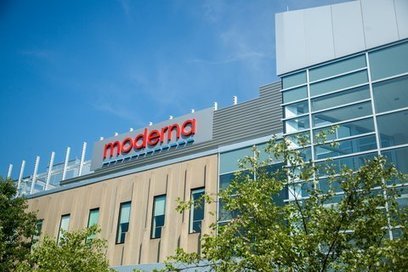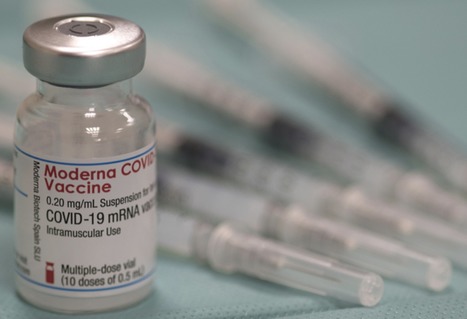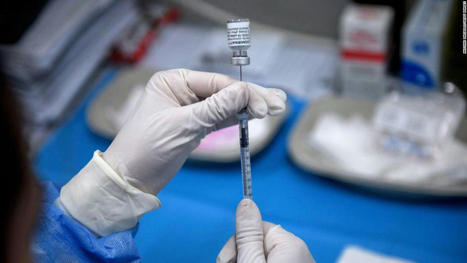 Your new post is loading...

|
Scooped by
Juan Lama
|
Moderna Inc said on Sunday it has been told that the U.S. Food and Drug Administration will require additional time to complete its assessment of the company's COVID-19 vaccine for use in adolescents aged 12 to 17 years. The FDA informed Moderna that the review may not be completed before January 2022, the company said in a statement, dealing a potential setback to the timing of an emergency use authorization (EUA) for that age group. Moderna Chief Executive Stephane Bancel told Reuters last week that based on conversations with the agency, he believed the vaccine would be authorized for those 12 to 17 in the next few weeks. The U.S. biotech company said it was told late on Friday that the FDA needed the additional time to evaluate recent international analyses of the risk of a type of heart inflammation called myocarditis after vaccination, a rare side effect that has primarily affected young males. Moderna said it is conducting its own review of new external analyses on the increased myocarditis risk in those less than 18 years of age as they become available. Moderna applied for U.S. authorization of its shot for those aged 12 to 17 in June. Americans of those ages are eligible for the similar COVID-19 vaccine from Pfizer Inc (PFE.N) and partner BioNTech SE after it was cleared by the FDA and Centers for Disease Control and Prevention in May. Moderna also said it will delay filing its request for an EUA for a half strength 50-microgram dose of the vaccine for children ages 6 to 11 while the FDA completes its review of the 12-17 filing. Reporting by Sneha Bhowmik in Bengaluru; Editing by Bill Berkrot

|
Scooped by
Juan Lama
|
BACKGROUND Until very recently, vaccines against severe acute respiratory syndrome coronavirus 2 (SARS-CoV-2) had not been authorized for emergency use in persons younger than 16 years of age. Safe, effective vaccines are needed to protect this population, facilitate in-person learning and socialization, and contribute to herd immunity. METHODS In this ongoing multinational, placebo-controlled, observer-blinded trial, we randomly assigned participants in a 1:1 ratio to receive two injections, 21 days apart, of 30 μg of BNT162b2 or placebo. Noninferiority of the immune response to BNT162b2 in 12-to-15-year-old participants as compared with that in 16-to-25-year-old participants was an immunogenicity objective. Safety (reactogenicity and adverse events) and efficacy against confirmed coronavirus disease 2019 (Covid-19; onset, ≥7 days after dose 2) in the 12-to-15-year-old cohort were assessed. RESULTS Overall, 2260 adolescents 12 to 15 years of age received injections; 1131 received BNT162b2, and 1129 received placebo. As has been found in other age groups, BNT162b2 had a favorable safety and side-effect profile, with mainly transient mild-to-moderate reactogenicity (predominantly injection-site pain [in 79 to 86% of participants], fatigue [in 60 to 66%], and headache [in 55 to 65%]); there were no vaccine-related serious adverse events and few overall severe adverse events. The geometric mean ratio of SARS-CoV-2 50% neutralizing titers after dose 2 in 12-to-15-year-old participants relative to 16-to-25-year-old participants was 1.76 (95% confidence interval [CI], 1.47 to 2.10), which met the noninferiority criterion of a lower boundary of the two-sided 95% confidence interval greater than 0.67 and indicated a greater response in the 12-to-15-year-old cohort. Among participants without evidence of previous SARS-CoV-2 infection, no Covid-19 cases with an onset of 7 or more days after dose 2 were noted among BNT162b2 recipients, and 16 cases occurred among placebo recipients. The observed vaccine efficacy was 100% (95% CI, 75.3 to 100). CONCLUSIONS The BNT162b2 vaccine in 12-to-15-year-old recipients had a favorable safety profile, produced a greater immune response than in young adults, and was highly effective against Covid-19. (Funded by BioNTech and Pfizer; C4591001 ClinicalTrials.gov number, NCT04368728. opens in new tab.) Published in NEJM (May 27, 2021): https://doi.org/10.1056/NEJMoa2107456

|
Scooped by
Juan Lama
|
Moderna has dosed the first adolescents in a phase 2/3 clinical trial designed to position its COVID-19 vaccine for use in children as young as 12 years old before the start of the 2021-22 school year. Having shown mRNA vaccine mRNA-1273 is safe and effective in adults, Moderna is now running a 3,000-subject trial in adolescents. Moderna is aiming to deliver data in adolescents in the spring of 2021, setting it up to get an expanded label in time for a vaccination campaign ahead of the next school year. “By the time we go back in September 2021, the kids can go back to school with a normal school year, which is so important to know in terms of equality and then kids’ development and education and mental health and so on. That's our plan for adolescents,” Moderna CEO Stéphane Bancel said at a recent investor event. COVID-19 outcomes in adolescents are typically better than in adults, with the severity of disease roughly correlating with age. However, children have been negatively affected by school closures, particularly in the U.S. where states have been accused of prioritizing businesses over K-12 when it comes to making decisions about what to shut to control the coronavirus. Countries in Europe have typically prioritized keeping schools open. Moderna wants to help states keep schools open next year—and access an additional population—by running a clinical trial that will randomize adolescents to receive either the 100-μg vaccine dose used in the adult phase 3 or placebo. Like adults, adolescents will receive two doses 28 days apart. The size of the trial and rate of symptomatic COVID-19 in adolescents means Moderna is unlikely to be able to show its vaccine prevents disease by the spring. However, if a correlate of protection is found, Moderna could use that to infer efficacy. Alternatively, the biotech will infer efficacy through immunobridging to the adult population. Safety and reactogenicity are the primary endpoints. COVID-19 vaccine trials have so far mainly enrolled adults aged 18 years and older. Pfizer amended its phase 2/3 protocol to support enrollment of younger people partway through the trial and sent the FDA reactogenicity data on 100 adolescents aged 12 to 15 years in its filing for emergency use authorization. However, Pfizer is not currently seeking EUA in children as young as 12 years as it has too few data to support a favorable benefit-risk determination. Pfizer is seeking authorization in adolescents aged 16 and 17 years, though, despite lacking solicited reactogenicity data as of the cutoff for the EUA. Reactions were detected and reported as unsolicited adverse events. The EUA safety population includes data on 283 people aged 16 or 17 years. Having administered its vaccine to hundreds of adolescents, Pfizer is ahead of Moderna in the race for that part of the market. But the potential for the back-to-school period to see surging demand for vaccines authorized for use in adolescents suggests Pfizer’s lead may not translate into a meaningful advantage.
|

|
Scooped by
Juan Lama
|
Phase 2/3 data now published in The New England Journal of Medicine showed that the Moderna COVID-19 vaccine was safe and generated strong activity against SARS-CoV-2 in adolescents, with an immune response similar to that of young adults. Moderna previously publicized the data in May and used them in its submission to the FDA in early June seeking authorization for the vaccine in adolescents. For the study, Kashif Ali, MD, a pediatrician at Kool Kids Pediatrics in Houston, and colleagues enrolled 3,732 participants aged 12 to 17 years and randomly assigned them to receive either the vaccine (n = 2,489) or placebo (n = 1,243). The researchers recorded no serious adverse events related to the vaccine, and no cases of COVID-19 were reported 2 weeks after participants received the second dose, compared with four cases in the placebo arm. In the primary analysis, the geometric mean titer ratio for neutralizing antibodies in adolescents relative to young adults was 1.08 (95% CI, 0.94-1.24), the authors said. Additionally, the absolute difference in serologic response was 0.2 percentage points (95% CI, –1.8 to 2.4), they noted. Research cited published in NEJM (August 12, 2021): https://doi.org/10.1056/NEJMoa2109522

|
Scooped by
Juan Lama
|
Clinical trial results of Pfizer/BioNTech's Covid-19 vaccine show it is 100% efficacious and well tolerated in youths 12-15. Pfizer/BioNTech plan to submit the data to the US Food and Drug Administration as soon as possible for expanded emergency use authorization of the two-dose vaccine. In a Phase 3 trial of 2,260 participants ages 12 to 15 in the US, the vaccine elicited strong antibody responses one month after the second dose -- exceeding those demonstrated in people ages 16 to 25 in previous trials, Pfizer reported. The vaccine is currently authorized in the US for emergency use in people 16 and older. Researchers observed 18 Covid-19 cases among the 1,129 participants who were given a placebo, and none among the 1,131 volunteers who got the vaccine. The data has yet to be peer reviewed. Pfizer/BioNTech added that the side effects seen in the young teens were similar to those seen among 16 to 25-year-olds. Common side effects include pain at the injection site, fatigue and fever. The participants will be monitored for protection and safety for two years after their second dose. Those comparisons to the older population are important, because researchers are building off of the knowledge they gained in the adult trials. Researchers can define a number of antibodies that are a correlate of the protection seen in adults, and then look for that level of antibodies in pediatric participants to know that the vaccine is providing protection. That's why the Covid-19 vaccine trials in children and adolescents have generally required fewer volunteers than the adult trials. "We share the urgency to expand the authorization of our vaccine to use in younger populations and are encouraged by the clinical trial data from adolescents between the ages of 12 and 15," said Pfizer CEO Albert Bourla. "We plan to submit these data to FDA as a proposed amendment to our Emergency Use Authorization in the coming weeks and to other regulators around the world, with the hope of starting to vaccinate this age group before the start of the next school year." Dr. Peter Hotez, co-director of the Center for Vaccine Development at Texas Children's Hospital, said on CNN's New Day Wednesday, said schools can open without vaccinating students, but vaccines will help. "I think it's likely a green light to move forward, to move down in terms of vaccinating adolescents 12 to 15," Hotez said, noting that the vaccine will still need to be evaluated for authorization in that age group. "The bottom line is that by the fall I think there's a good possibility we'll be vaccinating teenagers, 12 and up, and for middle schools, junior high schools, high schools, it's really good news in the United States for both teachers and staff. We'll have teachers and staff vaccinated, we'll have the students vaccinated in those middle schools and high schools." A return to the classroom isn't the only factor at play. Health experts have emphasized the importance of protecting as many people as possible through vaccination, as more infectious Covid-19 variants continue to spread throughout the nation. "We all long for a normal life. This is especially true for our children," said BioNTech CEO Ugur Sahin. "The initial results we have seen in the adolescent studies suggest that children are particularly well protected by vaccination, which is very encouraging given the trends we have seen in recent weeks regarding the spread of the B.1.1.7 UK variant." Pfizer recently told CNN that the safety demonstrated in this adolescent trial helped the company make the decision to begin testing its vaccine in younger children. A separate Phase 1/2/3 study of the Pfizer/BioNTech vaccine in children ages 6 months to 11 years launched last week, when the first children ages 5 to 11 received a shot. Pfizer/BioNTech plans to begin dosing 2 to 5-year-olds next week and work its way down to participants ages 6 months to 2 years. The company aims to enroll 4,644 children in the trial and expects results by the end of 2021. Moderna is also testing its vaccine in adolescents and children, in two clinical trials of children ages 12 to 17 and those ages 6 months to 11 years. Experts anticipate Covid-19 vaccines won't be available for children 11 and younger in time for the upcoming school year. Dr. Anthony Fauci, director of the National Institute of Allergy and Infectious Diseases, has said those younger children may have to wait until the first quarter of 2022. Dr. Buddy Creech, director of Vanderbilt University's Vaccine Research Program and an investigator in Moderna's pediatric trials, estimates a Covid-19 vaccine could be available for high-risk kids 12 and older by July or August, but likely won't be available for children 11 and younger until November or December, at the earliest.
|



 Your new post is loading...
Your new post is loading...











